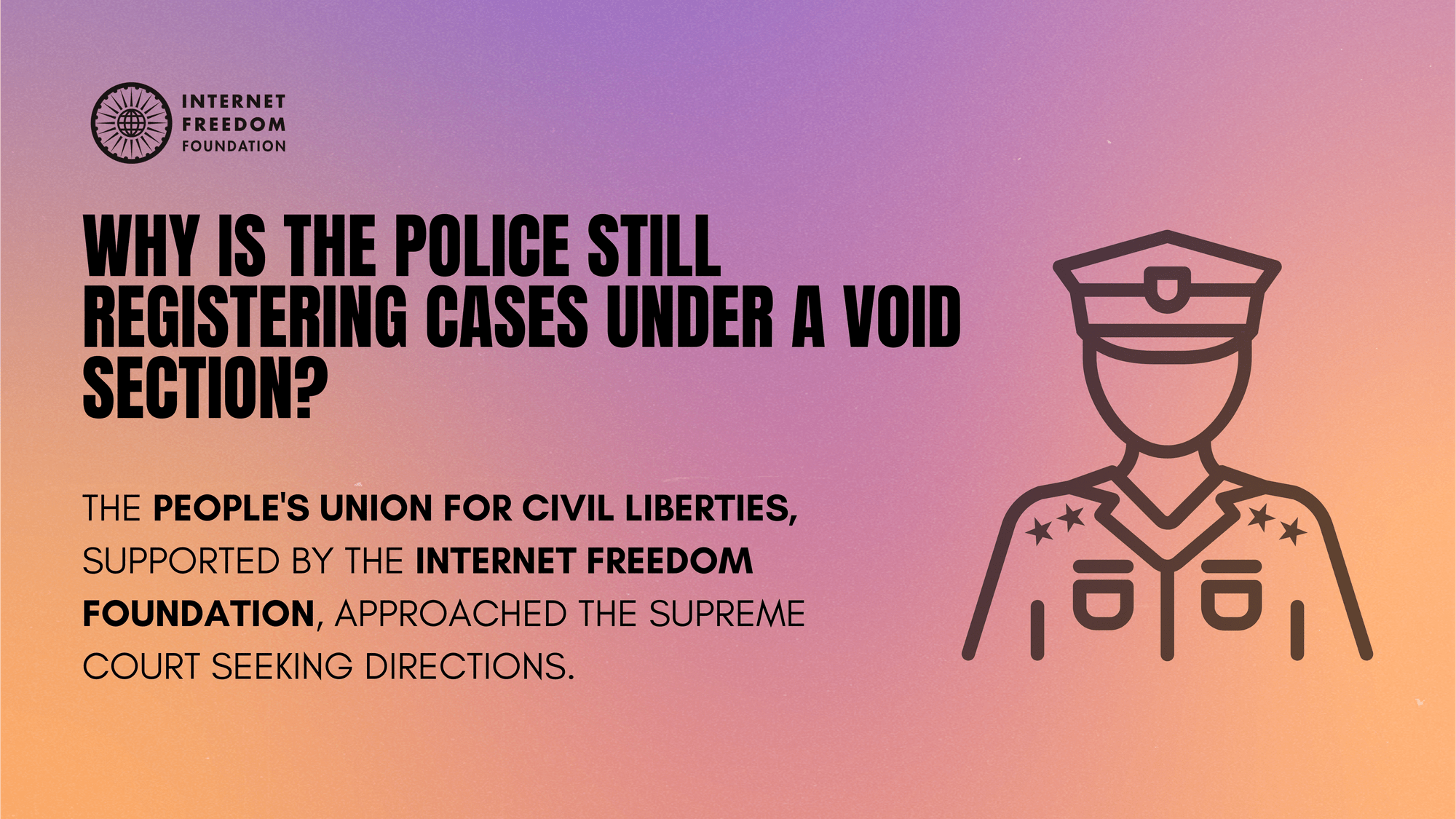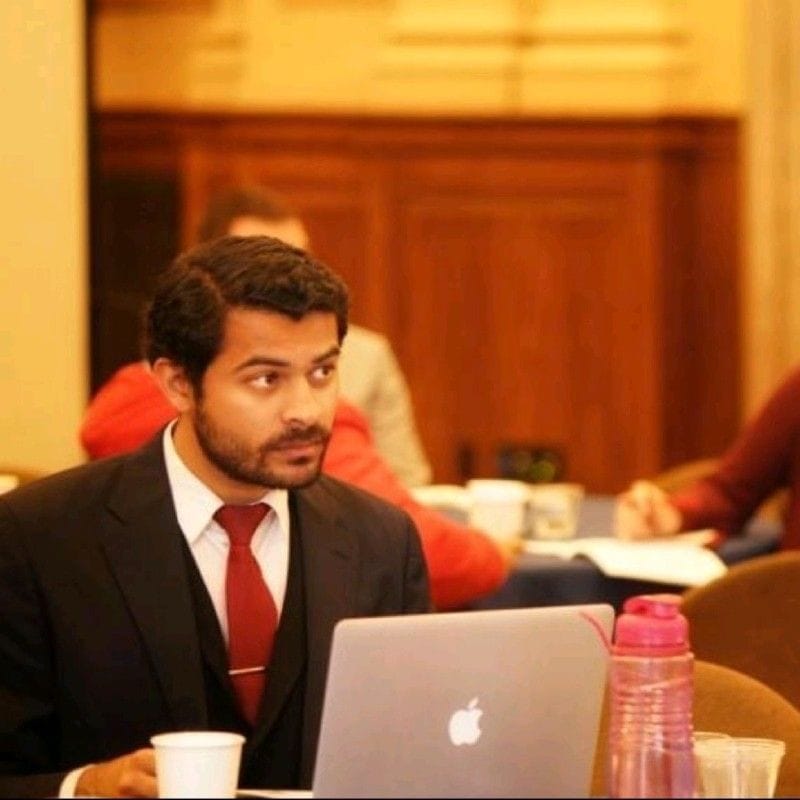
Tl;dr
Supreme Court has issued notice and directed the Union of India to file a counter-affidavit within two weeks, in an application filed by the People’s Union for Civil Liberties (PUCL). PUCL has approached the Supreme Court seeking directions to ensure that individuals are not prosecuted under Section 66A of the Information Technology Act, 2000, which the Supreme Court struck down in Shreya Singhal vs Union of India & Ors., (2015) 5 SCC 1. IFF provided legal assistance to PUCL in its application.
Background
S. 66A of the Information Technology Act, 2000 (IT Act) criminalised “offensive speech” over the internet. This provision was used to suppress dissent across the political spectrum. In March 2015, the Supreme Court in Shreya Singhal vs Union of India & Ors., (2015) 5 SCC 1 (Shreya Singhal) declared that the provision was void ab initio, i.e. was deemed never to have existed on the statute books as it violated Article 19(1)(a) of the Constitution (summary).
As a result of this judgment, all pending cases should have been dismissed, and no new cases should have been instituted under S. 66A. However, in 2018 a research paper by Abhinav Sekhri and Apar Gupta demonstrated that Section 66A was being used to prosecute individuals all over the country.
In January 2019, taking note of the research paper, People’s Union for Civil Liberties (PUCL), one of the original petitioners in Shreya Singhal, with assistance from IFF, approached the Supreme Court. PUCL sought directions from the Supreme Court to ensure implementation of the decision in Shreya Singhal. In February 2019, the Supreme Court directed the Union of India to ensure compliance with its decision by making available copies of the judgment to Chief Secretaries across the country. The Chief Secretaries, in turn, were directed to sensitise police departments across the country.
IFF and CDL develop Zombie Tracker
Despite the directions of the Supreme Court, we came across reports which showed that S. 66A was still being invoked in fresh cases and pending cases were not being dismissed. Therefore, in collaboration with Civic Data Labs (CDL), we built a platform - Zombie Tracker - to track cases which include a charge under S. 66A. The Zombie Tracker provides details of S. 66A cases registered between 27.10.2009 and 15.02.2020 (both ongoing and disposed of cases) in 11 states. Data generated from Zombie Tacker bolster our advocacy efforts to ensure such cases are dismissed, and fresh cases are not registered. As of 03.07.2021, our findings indicate that as many as 810 cases are pending before the district courts in 11 States.
Concerned with continued enforcement of S. 66A, PUCL again approaches Supreme Court
PUCL is one of the foremost civil liberties organisations in the country. They have filed several cases apart from the petition challenging the constitutionality of S.66A, which have led to landmark judgments that expanded human rights in India. Some of these landmark cases include Telephone tapping case (1997) 1 SCC 301, Fake police encounter in Manipur (1997) 3 SCC 463; Disclosure of criminal background and assets by political candidates, (2003) 9 SCC 490; Challenge to POTA (2004) 9 SCC 980; and Encounter killings in Maharashtra, (2014) 10 SCC 635.
In line with the continuation of their brave efforts to defend the civil liberties of Indians, PUCL filed a Miscellaneous Application before the Hon’ble Supreme Court seeking additional directions to ensure compliance with the decision in Shreya Singhal. IFF has provided legal assistance to PUCL in drafting the Application.
In the Application, PUCL has referred to the findings on the Zombie Tracker and brought to the notice of the Supreme Court the ongoing cases where individuals are being tried under S.66A. These cases include the case of State v. Shekhar Rahul Nikam, RCC No. 1119/2018, pending before a Judicial Magistrate in Nashik. In this case, on 28.02.2020, charges were framed against the accused solely under S. 66A of the IT Act based on “offensive messages” sent in 2010. PUCL has also referred to the even more shocking case of State v. Mohd. Sakir, Cr. Case No. 296349/2016 pending before a Magistrate at Tis Hazari Court, Delhi. In Mohd. Sakri, the FIR against the accused, is registered solely under S.66A, and at one of the hearings, the prosecutor even informed the Court that S.66A had been struck down by the Supreme Court in Shreya Singhal. Yet, the magistrate issued a non-bailable warrant against the accused!
To prevent such continued enforcement of S.66A, PUCL has urged Supreme Court to - a) direct National Crime Records Bureau to collect data from across the country (district courts/high courts) regarding FIR’s and pending cases where S.66A has been invoked; b) direct the Supreme Court Registry to inform all district courts throughout the country to take cognizance of the decision in Shreya Singhal in all proceedings where S.66A has been invoked; c) direct the Supreme Court Registry to communicate to High Court’s to collect information from all District Courts regarding the pendency of cases under S.66A within their jurisdiction and issue directions for compliance with Shreya Singhal; d) direct Union of India to issue advisory to all police stations not to register cases under S.66A; and e) direct Union of India to publish in leading newspapers informing the general public that S.66A has been struck down.
Supreme Court hears PUCL’s Application
PUCL’s application came up for hearing before a three-judge Supreme Court bench consisting of Justice Nariman, Justice Joseph and Justice Gavai. The bench was pleased to issue notice on the application and directed the Union of India to file a reply within two weeks.
PUCL was represented by Senior Advocate Sanjay Parikh, Aparna Bhat, Karishma Maria, Sanjana Srikumar, Abhinav Sekhri, Vrinda Bhandari, Tanmay Singh and Krishnesh Bapat. The Union of India was represented by the Attorney General for India, Mr K.K Venugopal.
We thank PUCL for granting us an opportunity to provide legal assistance to them. We are also deeply grateful to the lawyers who worked on this case, especially senior Advocate Sanjay Parikh, who has led the legal team.
Important Documents
- Application filed by PUCL (link)
- Zombie Tracker (link)
- Research paper titled ‘Section 66A and other legal zombies’ by Abhinav Sekhri and Apar Gupta (link)
- IFF post summarising the February 2019 Supreme Court decision which directed Union of India to ensure compliance with the decision in Shreya Singhal (link)
- IFF post noting the non-compliance Supreme Court decision of February 2019 and announcing the development of the Zombie Tracker (link)
- IFF post providing an update on the development of the Zombie Tracker (link)
- IFF post marking the fifth anniversary of the Shreya Singhal Judgment (link)
- IFF post calling for greater participation in the consultation process of the Draft Vision Document (link)

